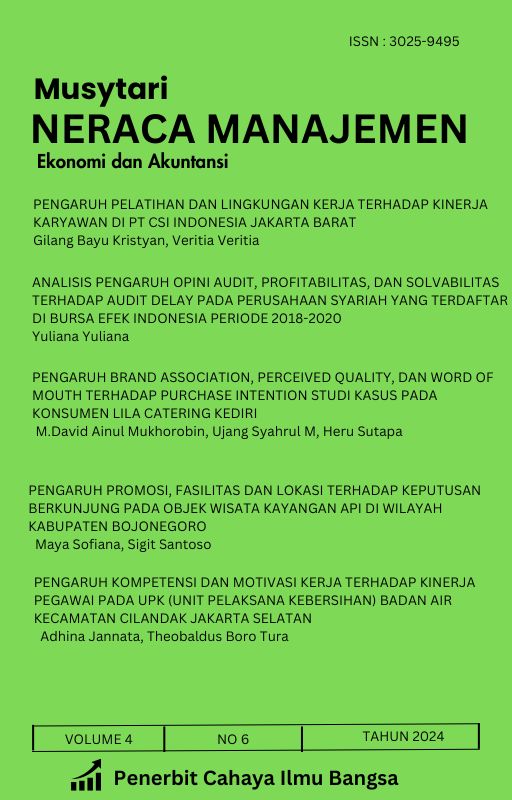Published 2025-05-31
Keywords
- Manajemen Operasional,
- UMKM,
- Keberlanjutan,
- Manajemen Lean,
- Efisiensi
- Rantai Pasok ...More
How to Cite
Abstract
Artikel ini bertujuan untuk mengeksplorasi peran manajemen operasional dalam mengoptimalkan keberlanjutan usaha di sektor UMKM (Usaha Mikro, Kecil, dan Menengah). Penelitian ini menggunakan pendekatan kualitatif dengan studi literatur untuk memeriksa teori, konsep, dan strategi yang relevan dalam meningkatkan efisiensi operasional dan keberlanjutan bisnis jangka panjang. Pembahasan mencakup berbagai strategi, termasuk manajemen lean, adopsi teknologi digital, pengelolaan rantai pasok, dan praktik keberlanjutan dalam operasional. Artikel ini menyimpulkan bahwa manajemen operasional yang efisien sangat penting bagi UMKM untuk mengurangi pemborosan, meningkatkan produktivitas, mempertahankan kualitas produk, dan memastikan keberlanjutan jangka panjang. Dengan menerapkan strategi ini, UMKM dapat memperkuat daya saing dan memberikan kontribusi positif bagi ekonomi dan lingkungan.
References
- [1] F. B. Abdelaziz, H. Alaya, and P. K. Dey, “A multi-objective particle swarm optimization algorithm for business sustainability analysis of small and medium sized enterprises,” Ann Oper Res, vol. 293, no. 2, pp. 557–586, Oct. 2020, doi: 10.1007/s10479-018-2974-0.
- [2] J. Vásquez, S. Aguirre, E. Puertas, G. Bruno, P. C. Priarone, and L. Settineri, “A sustainability maturity model for micro, small and medium-sized enterprises (MSMEs) based on a data analytics evaluation approach,” Journal of Cleaner Production, vol. 311, p. 127692, 2021.
- [3] M. Singh, R. Rathi, and J. A. Garza-Reyes, “Analysis and prioritization of Lean Six Sigma enablers with environmental facets using best worst method: A case of Indian MSMEs,” Journal of cleaner production, vol. 279, p. 123592, 2021.
- [4] B. Triwahyono, T. Rahayu, and K. Kraugusteeliana, “Analysing the role of technological innovation in improving the operational efficiency of MSMEs,” Jurnal Minfo Polgan, vol. 12, no. 1, pp. 1417–1426, 2023.
- [5] A. Prashar, “Towards sustainable development in industrial small and Medium-sized Enterprises: An energy sustainability approach,” Journal of Cleaner Production, vol. 235, pp. 977–996, 2019.
- [6] S. Khurana, A. Haleem, and B. Mannan, “Determinants for integration of sustainability with innovation for Indian manufacturing enterprises: Empirical evidence in MSMEs,” Journal of Cleaner Production, vol. 229, pp. 374–386, 2019.
- [7] S. A. Hendrawan, A. Chatra, N. Iman, S. Hidayatullah, and D. Suprayitno, “Digital transformation in MSMEs: Challenges and opportunities in technology management,” Jurnal Informasi dan Teknologi, pp. 141–149, 2024.
- [8] S. Khurana, A. Haleem, S. Luthra, and B. Mannan, “Evaluating critical factors to implement sustainable oriented innovation practices: An analysis of micro, small, and medium manufacturing enterprises,” Journal of Cleaner Production, vol. 285, p. 125377, 2021.
- [9] N. Virmani, S. Bera, and R. Kumar, “Identification and testing of barriers to sustainable manufacturing in the automobile industry: a focus on Indian MSMEs,” Benchmarking: An International Journal, vol. 28, no. 3, pp. 857–880, 2021.
- [10] A. G. Khanzode, P. R. S. Sarma, S. K. Mangla, and H. Yuan, “Modeling the Industry 4.0 adoption for sustainable production in Micro, Small & Medium Enterprises,” Journal of Cleaner Production, vol. 279, p. 123489, 2021.
- [11] Z. Afdal, M. K. Siwi, and T. Kurniawati, “MSMEs Business Sustainability: A Literature Review,” in Seventh Padang International Conference On Economics Education, Economics, Business and Management, Accounting and Entrepreneurship (PICEEBA 2021), Atlantis Press, 2021, pp. 317–322. Accessed: Nov. 21, 2024. [Online]. Available: https://www.atlantis-press.com/proceedings/piceeba-21/125964006
- [12] M. Gunawan, R. Asyahira, and F. M. Sidjabat, “Environmental management system implementation in MSMEs: a literature review,” Jurnal Serambi Engineering, vol. 5, no. 2, 2020, Accessed: Nov. 21, 2024. [Online]. Available: https://mail.ojs.serambimekkah.ac.id/jse/article/view/1958
- [13] A. Behl, J. Gaur, V. Pereira, R. Yadav, and B. Laker, “Role of big data analytics capabilities to improve sustainable competitive advantage of MSME service firms during COVID-19–A multi-theoretical approach,” Journal of Business Research, vol. 148, pp. 378–389, 2022.
- [14] S. Yadav, M. Chowdary, G. Veeramani, B. R. Celia, S. Pal, and O. Prakash, “Impact of supply chain management on the Indian SME operational effectiveness,” Journal of Informatics Education and Research, vol. 3, no. 2, 2023, Accessed: Nov. 21, 2024. [Online]. Available: http://jier.org/index.php/journal/article/view/280
- [15] P. Upadhyay and A. Kundu, “Linkage between business sustainability and tacit knowledge management in MSMEs: A case-based study,” VINE Journal of Information and Knowledge Management Systems, vol. 50, no. 3, pp. 477–494, 2020.
- [16] F. Menne, B. Surya, M. Yusuf, S. Suriani, M. Ruslan, and I. Iskandar, “Optimizing the financial performance of smes based on sharia economy: Perspective of economic business sustainability and open innovation,” Journal of Open Innovation: Technology, Market, and Complexity, vol. 8, no. 1, p. 18, 2022.

